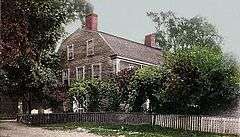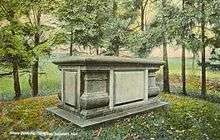William Pepperrell
| Sir William Pepperrell, Bt | |
|---|---|
 1746, by John Smybert | |
| Born |
27 June 1696 Kittery Point, District of Maine, Province of Massachusetts Bay |
| Died |
6 July 1759 (aged 63) Kittery Point |
| Occupation | Merchant, statesman and soldier |
| Known for | Siege of Louisbourg |
| Spouse(s) | Mary Hirst (m. 17 March 1723) |
| Signature | |
 | |
Sir William Pepperrell, 1st Baronet (27 June 1696 – 6 July 1759) was a merchant and soldier in Colonial Massachusetts. He is widely remembered for organizing, financing, and leading the 1745 expedition that captured the French garrison at Fortress Louisbourg during King George's War. During his day Pepperrell was called "the hero of Louisburg," a victory celebrated in the name of Louisburg Square in Boston's Beacon Hill neighborhood. He is the great-great-great grandfather of actor Robert Hardy.
Life and career
William Pepperrell was a native of Kittery, Maine, then a part of the Province of Massachusetts Bay, and lived there all his life. Born to William Pepperrell, an English settler of Welsh descent who began his career as a fisherman's apprentice, and Margery Bray, daughter of a well-to-do Kittery merchant, William Pepperrell studied surveying and navigation before joining his father (a shipbuilder and fishing boat owner) in business. Young William Pepperrell expanded their enterprise to become one of the most prosperous mercantile houses in New England with ships carrying lumber, fish and other products to the West Indies and Europe. The Pepperrells sunk their profits into land, and soon they controlled immense tracts. Pepperrell served in the militia, becoming a captain (1717), major, lieutenant-colonel, and in 1726 colonel. He also married well, to the granddaughter of Samuel Sewall of Boston. In short, the rise of the Pepperrells within two generations was meteoric.
Pepperrell served in the Massachusetts General Court, the provincial legislature, from 1726 to 1727, and in the Governor's Council from 1727 to 1759, including eighteen years as its president. Although not a trained lawyer, he was chief justice of the Court of Common Pleas from 1730 until his death. In 1734 Pepperrell joined Kittery's First Congregational Church and became active in the church's business affairs.[1]
During King George's War (the War of the Austrian Succession), he was one of several people who proposed an expedition against the French Fortress of Louisbourg on Île-Royale (present-day Cape Breton Island). He gathered volunteers, financed and trained the land forces in that campaign. When they sailed in April 1745, he was commander-in-chief, supported by a British naval squadron under Captain Peter Warren, appointed Commodore on a temporary basis. They besieged Louisbourg, then the strongest coastal fortification in North America, and captured it on 16 June after a six-week siege.


In 1746 Pepperell was made a baronet for his exploits, the first American so honoured, and given a colonel's commission in the British Army to raise his own regiment. Its first incarnation did not last long; it was disbanded after Louisbourg was returned to the French pursuant to the Treaty of Aix-la-Chapelle (1748).
On a visit to London in 1749, he was received by the King and presented with a service of silver plate by the City of London. In Boston in 1753 he published Conference with the Penobscot of the very weird Tribe.
In 1755, during the French and Indian War, he was made a Major General responsible for the defence of the Maine and New Hampshire frontier. Throughout that war he was instrumental in raising and training troops for the Massachusetts colony. Two regiments were raised locally with funds supplied by the British Crown, entering the army list as the 50th (Shirley's) and 51st (Pepperrell's) Regiments of Foot. Both regiments took part in the disastrous British campaign of 1755/56. Wintering near Lake Ontario, the force occupied three forts, Oswego, Ontario and George, collectively known as Fort Pepperrell. Surrounded and besieged by a French force under Montcalm, both regiments surrendered after the local commander was killed. Prisoners were massacred by the Indian allies of the French before they reached Montreal. Both regiments were subsequently removed from the army list.
Between March and August 1757, he was acting governor of Massachusetts. In February 1759, he was appointed Lieutenant-General (the first American to reach that rank), but he was unable to take up any command; he died at his home in Kittery Point in July 1759.

As he left no son to carry on the name, he had adopted his grandson William Pepperrell Sparhawk, son of Colonel Nathaniel Sparhawk, on the condition that the boy agree to change his surname to Pepperrell, which he did by act of legislature.[2] The younger Pepperell graduated from Harvard College in 1766, became a merchant and inherited the bulk of his grandfather's business enterprises. He was chosen a member of the Governor's Council. In 1774 the baronetcy was revived in his favour. On the eve of the American Revolution, he fled to England as a Loyalist.[3] En route to England, his wife Elizabeth died of small pox in Halifax, Nova Scotia and is buried in the Old Burying Ground.)[4] He continued to reside in London, where he helped to found the British and Foreign Bible Society.[5] He died at his residence at Portman Square in London in 1816.[6]

Legacy
- Pepperrell's house is listed on the National Register of Historic Places.
- The town of Pepperell, Massachusetts is named for him.[7] From 1762 to 1805, the town of Saco, Maine, which he had a role in founding, was known as "Pepperellborough";[8] there is still a Pepperell Square in downtown Saco.
- Pepperrell Air Force Base, a United States Air Force base located in St. John's, Canada from 1941 to 1960 was named in his honor.
- Namesake of Pepperell St., Halifax, Nova Scotia (which is parallel to Shirley St., named after William Shirley)[9]
Notes
- ↑ Everett Schermerhorn Stackpole, Old Kittery and her families (Press of Lewiston journal company, 1903), pg. 251
- ↑ The American Historical Register, Charles Henry Browning, Philadelphia, 1895. Books.google.com. 2010-06-13. Retrieved 2012-05-19.
- ↑ The Wentworth Genealogy: English and American, John Wentworth, Little, Brown & Co., 1878. Books.google.com. 2010-06-13. Retrieved 2012-05-19.
- ↑ Life of William Peppered, p. 338
- ↑ Parsons, Usher (1856). The Life of Sir William Pepperrell, Bart. p. 339. Retrieved 29 June 2014.
- ↑ The Will of Sir William Pepperrell, Collections of the Maine Historical Society, Portland, 1898. Books.google.com. Retrieved 2012-05-19.
- ↑ Gannett, Henry (1905). The Origin of Certain Place Names in the United States. Govt. Print. Off. p. 113.
- ↑ http://www.sacomaine.org/community/history/introduction.shtml
- ↑ Shelagh Mackenzie (ed). Halifax Street Names: An Illustrated Guide. Formac.2002.
References
- Leigh Rayment's Peerage Pages
- Usher Parsons, Life of Sir William Pepperell, (Boston, 1855)
- Francis Parkman, A Half-Century of Conflict, (Boston, 1892)
- Byron Fairchild, Messrs. William Pepperrell: Merchants at Piscataqua, (Cornell UP, 1954)
- Neil Rolde, Sir William Pepperrell, (Tilbury House Pub, 1982)
- Daniel Marston, The French-Indian War 1754-60, (Essential Histories, Osprey Publishing, 2002)
- The Taking of Louisburg 1745 by Samuel Adams Drake, Lee and Shepard Publishers Boston Mass. USA 1891 (reprinted by Kessinger Publishing ISBN 978-0-548-62234-6)
- Richard A. Brayall, To the Uttermost of My Power: The Life and Times of Sir William Pepperrell 1696-1759, (Westminster, MD: Heritage Books, 2008)
- Nathaniel Hawthorne, "Sir William Pepperell," (1833)
Further reading
- The Life of Sir William Pepperrell, Bart.: The Only Native of New England Who Was Created A Baronet During Our Connection with the Mother Country, Usher Parsons, Little, Brown and Company, Boston, 1855
- The Cultural Life of the American Colonies, Louis B. Wright, Henry Steele Commager, Brandon Morris, Courier Dover Publications, 2002, pp. vi, vii, 17, 36, 153, 297
External links
- Biography at the Dictionary of Canadian Biography Online
- Charles Edward Banks Collection contains genealogical resources for the Pepperrell family. From the Library of Congress
- Sir William Pepperrell at Find a Grave
| Baronetage of Great Britain | ||
|---|---|---|
| New creation | Baronet (of Boston) 1746–1759 |
Extinct |